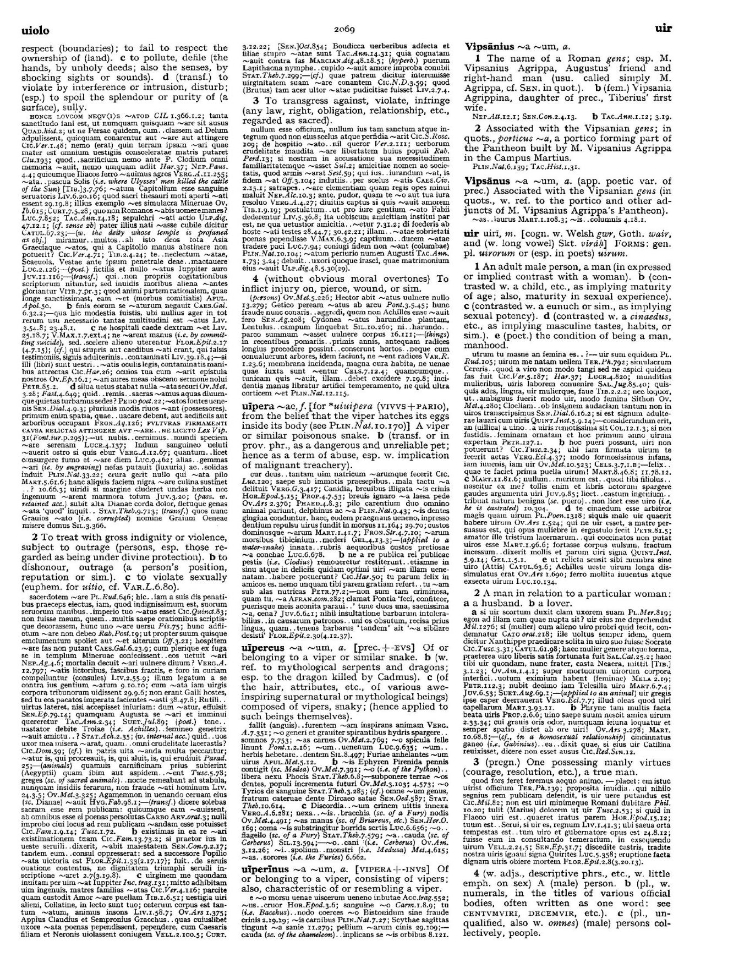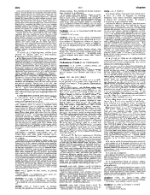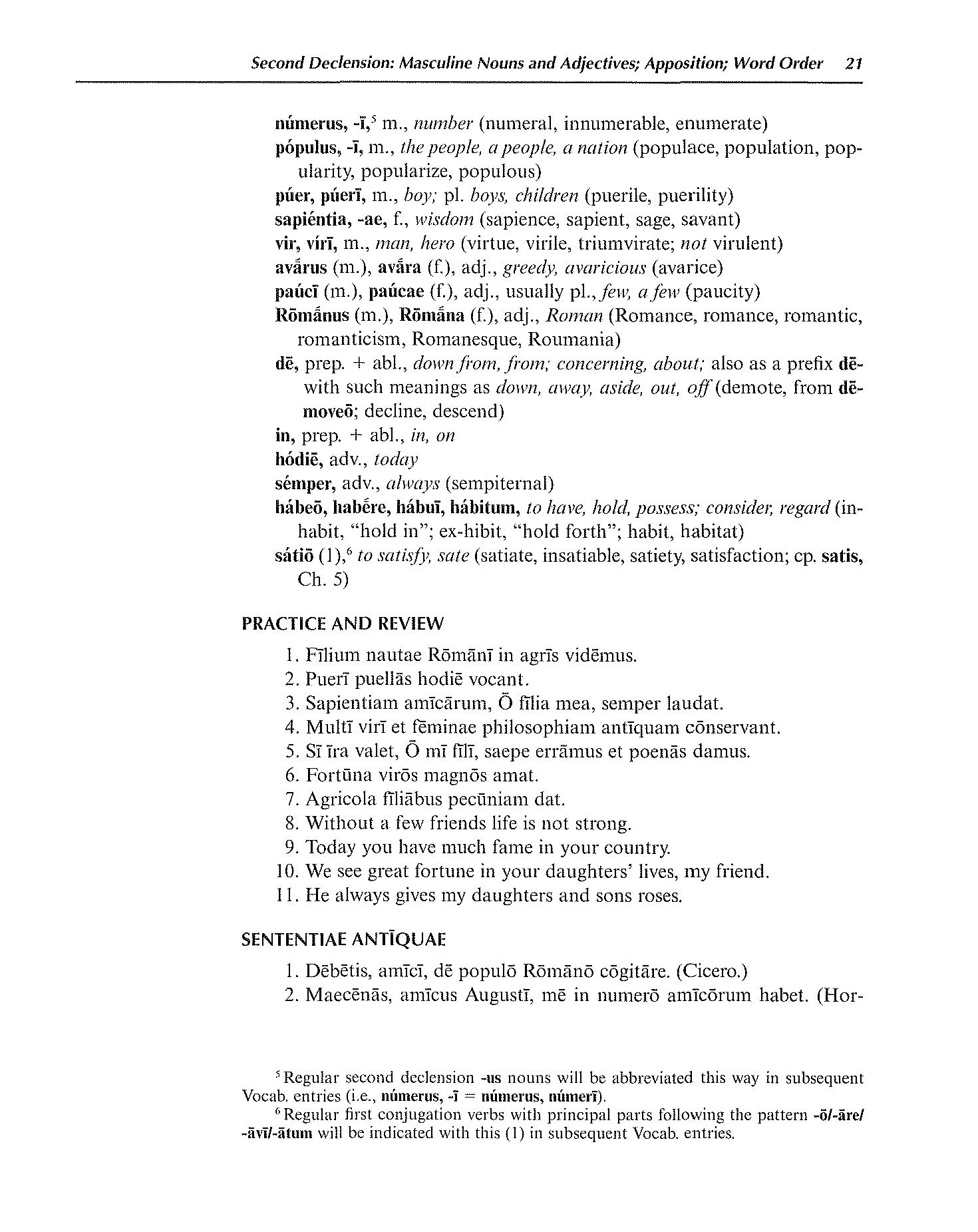
page_listing.tpl
page_subListingDetails.tpl
sub_listingDetails_style1.tpl
sub_listingDetails.title.tpl
vir man
vir is a Latin Noun that primarily means man.
Definitions for vir
Wheelock's Latin
Noun
- 1
man, hero
English derivatives:
virtue virile triumvirate
Oxford Latin Dictionary
Noun
- 1
An adult male person, a man (in expressed or implied contrast with a woman). (b) (contrasted w. a child, etc., as implying maturity of age; also, maturity in sexual experience). (c) (contrasted w. a eunuch or sim., as implying sexual potency). (d) (contrasted w. a cinaedus, etc., as implying masculine tastes, habits, or sim.). (e) (poet.) the condition of being a man, manhood.
- 2
A man in relation to a particular woman: a) a husband. b) a lover.
- 3
(pregn.) One possessing manly virtues (courage, resolution, etc.), a true man.
Sentences with vir
Latin to English
Agricola ad portam est vir bonus.Compare The farmer at the gate is a good man.
Vir quī librum tibi dedit tē laudāvit.Compare The man who gave the book to you praised you.
Fīlius magnī virī nōn semper est magnus vir. Compare The son of a great man is not always a great man.
Bonī virī ōtium amant.Compare Good men love peace.
Amīcus meus est vir magnī officiī.Compare My friend is a man of great service.
Decem virī satis sapientiae et multum virtūtis habuērunt.Compare The ten men had enough wisdom and much virtue.
Lūce clārissimā ab quattuor virīs vīsa, cōpiae fortissimae contrā hostēs missae sunt.Compare After a very clear light had been seen by the four men, the bravest troops were sent against the enemy.
Vir bonus nēminī nocēre vult; omnibus parcit, omnēs iuvat.Compare A good man wishes to harm nobody; he spares all, he helps all.
Declension table for vir
Cactus2000
| Singular | Plural | |
| Nom. | vir | virī |
| Gen. | virī | virum / -ōrum |
| Dat. | virō | virīs |
| Acc. | virum | virōs |
| Abl. | virō | virīs |
Data sources
Notes
- Definitions
- Frederick M. Wheelock, Wheelock's Latin, 6th ed., rev. Richard A. LaFleur (New York, NY: HarperCollins Publishers, 2005): 21.
- P. G. W. Glare, Oxford Latin Dictionary, Vols. 1-8 (Oxford: Clarendon Press, 1982): 2069.
- Word frequencies
- Christopher Francese, "Latin Core Vocabulary," Dickinson College Commentaries, last modified 2014, http://dcc.dickinson.edu.
- Paul B. Diederich, The Frequency of Latin Words and Their Endings, PhD diss., (Columbia University, 1939).
- Louis Delatte, Suzanne Govaerts, Joseph Denooz, and Etienne Evrard, Dictionnaire fréquentiel et index inverse de la langue latine [Frequency Dictionary and Inverse Index of the Latin Language] (Liège, Belgium: Laboratoire d'analyse statistique des langues anciennes de l'Université de Liège [L.A.S.L.A.], 1981): 119.
Bibliography
Allen, Joseph H. Allen and Greenough's New Latin Grammar for Schools and Colleges: Founded on Comparative Grammar. Edited by James B. Greenough, George L. Kittredge, Albert A. Howard, and Benjamin L. D'Ooge. Boston, MA: Ginn & Company, 1903.
Crystal, David. A Dictionary of Linguistics and Phonetics. 6th ed. Oxford, UK: Blackwell Publishing, 2008.
Delatte, Louis, Suzanne Govaerts, Joseph Denooz, and Etienne Evrard. Dictionnaire fréquentiel et index inverse de la langue latine [Frequency Dictionary and Inverse Index of the Latin Language]. Liège, Belgium: Laboratoire d'analyse statistique des langues anciennes de l'Université de Liège (L.A.S.L.A.), 1981.
Diederich, Paul B. The Frequency of Latin Words and Their Endings. PhD diss., Columbia University, 1939.
Francese, Christopher. "Latin Core Vocabulary." Dickinson College Commentaries. Last modified 2014. http://dcc.dickinson.edu/latin-vocabulary-list.
Gildersleeve, Basil L., and Gonzales Lodge. Gildersleeve's Latin Grammar: Third Edition, Revised, and Enlarged. 3rd ed. London, England: Macmillan and Co., 1903.
Glare, Peter G.W. Oxford Latin Dictionary. Vols. 1-8. Oxford, England: Clarendon Press, 1982.
Krüger, Bernd. "Latin Conjugation Tables." Cactus2000. Accessed May 5, 2023. https://latin.cactus2000.de/index.en.php.
Pierson, Nick. "Sound of Text." Accessed October 26, 2019. https://soundoftext.com.
Wheelock, Frederick M. Wheelock's Latin. 6th ed. Revised by Richard A. LaFleur. New York, NY: HarperCollins Publishers, 2005.
Wiktionary Contributors. "Victionarium." Wikimedia Foundation, Inc. Updated March 18, 2019. https://la.wiktionary.org/wiki/Victionarium:Pagina_prima.
Citation
Chicago (17th ed.)
Allo Contributors. "vir, virī (n.) - Latin Word Definition." Allo Latin Dictionary. Last modified . Accessed February 21, 2026. http://ancientlanguages.org/latin/dictionary/vir-viri.
Entry created on . Last updated on .








